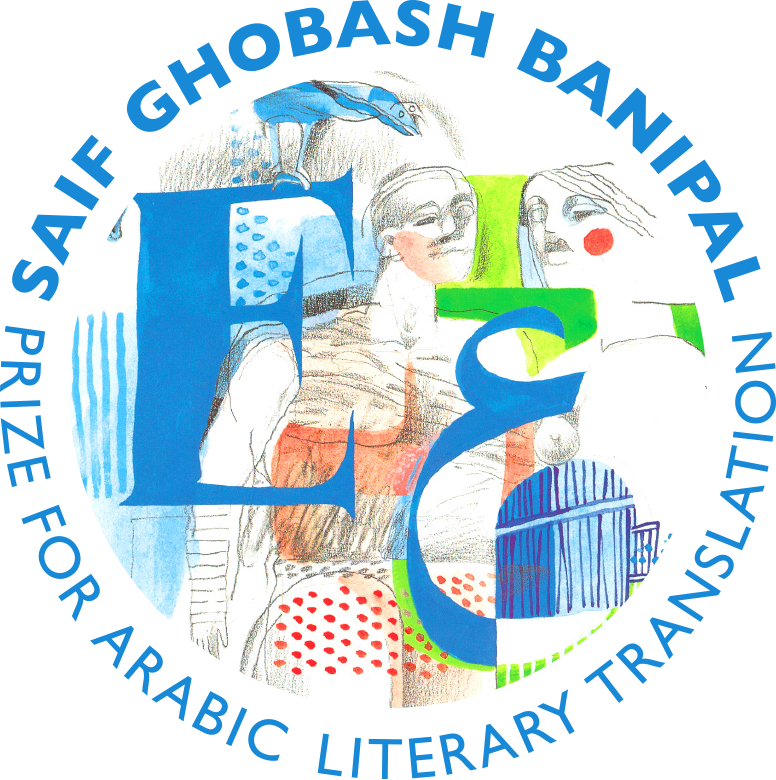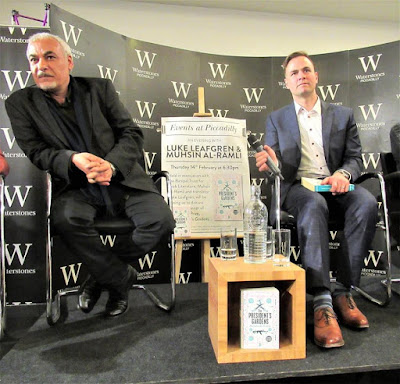LUKE LEAFGREN
wins the 2018 Prize
"A seamless
rendering of
an outstanding
work of fiction"
The 2018 Saif
Ghobash Banipal Prize for Arabic Literary Translation is awarded to Luke
Leafgren for his translation of the novel The President's Gardens by
Iraqi author Muhsin Al-Ramli, published by MacLehose Press. The judges chose
his translation from the shortlist of four works announced on 10 December 2018.
The award of £3,000 will be presented to Luke Leafgren on 13 February 2019 at
the Translation Prizes Award Ceremony, organised and hosted by the Society of
Authors, at the British Library's Knowledge Centre, along with the other
translation prizes being awarded this year.
The judging panel
comprised publisher and translator Pete Ayrton (chair), editor and translator
Georgia de Chamberet, Jordanian author Fadia Faqir, and university lecturer and
translator Sophia Vasalou. The prize is administered by Paula Johnson, Head of
Prizes and Awards at the Society of Authors.
THE JUDGES'
REPORT
THE WINNER
Luke Leafgren for his translation of the novel
The President's Gardens by Muhsin Al-Ramli
In this brilliant
novel the personal, political and fantastical are interwoven to excavate and
record Iraq's recent history in all its complexity, horror and absurdity. The
translation by Luke Leafgren is imperceptible and mirrors the writer's many
changes of register. The author is fortunate to have found a translator totally
in sympathy with his writing. Faced with many difficult choices, Leafgren has
produced a work both faithful to the Arabic and a work of art in English.
In a clear
reference to Gabriel Garcia Márquez's Macondo, which was destroyed by the
establishment of a banana plantation, Muhsin Al-Ramli's begins his novel with
the discovery of nine banana crates, each containing a severed, mutilated head
in an Iraqi village without bananas – one of the heads belonged to
Ibrahim, "the fated", who is made sterile by poison gas in the Iran
war, loses his foot during the invasion of Kuwait and, then, finds a job in the
President's Gardens.
When Ibrahim is
appointed to "care for these roses", he is impressed with how
immaculate the garden appears on the surface - the crimes lie beneath. His job
description and responsibilities keep shifting as he descends into the inferno
until he becomes a grave-digger.
Despite Ibrahim's
fear and fatalism, he begins to give the dead a dignified burial, register the
date and time of their killing, establish and document their identity by
painstakingly gathering shreds of evidence like skin, teeth, nails, etc.
Ibrahim's acts of
salvation give a history to the thousands of Iraqi disappeared. The point is
made that ordinary people can make a difference – giving an identity to
nameless corpses ensures that they cannot be forgotten.
Tender, funny,
tragic, wise and poetic, The President's Garden is imbued with
the richness and complexity of a region that has known little peace over the
last century. Luke Leafgren's translation conveys beautifully the
spirit and idiosyncrasies of the original. It is a seamless rendering of an
outstanding work of fiction. Both author and translator are to be warmly
congratulated.
* * *
Winner Luke
Leafgren says:
"Learning that my translation was selected for the shortlist was
already the recognition that pleased me more than any other in my life,
and I've been enjoying a complicated feeling of being grateful, humbled,
proud, and inspired ever since. I am so grateful to Muhsin for writing
this novel and then entrusting me with its translation. I think of Khaled
Al-Masri, my good friend and Arabic teacher who helped me get my start in
translating. I also feel my debt of gratitude to Yousif Hanna, an
Iraqi friend who read parts of The President's Gardenswith me
to answer all my linguistic and cultural questions, and who
could become a preeminent literary scholar if he weren't committed to a
career in medicine. Finally, to Paul Engles and Christopher MacLehose, for
believing in this book and publishing the translation."
Publisher
Christopher MacLehose says:
"This is wonderful news. It gives a publisher immense pride that the
scholarship and the genius of our translator should be recognised by the jury
for your award."
ABOUT THE
WINNING TRANSLATOR
Luke Leafgren is an
Assistant Dean of Harvard College and teaches Arabic at Harvard University,
where he received his PhD in Comparative Literature in 2012. He is also a keen
sailor, and the inventor of the StandStand portable standing desk.
As well as
translating the winning novel The President's Gardens, his
first venture into literary translation was Mushin Al-Ramli's second
novel Dates on my Fingers (2014). He has also translated the
debut novel of Shahad Al Rawi The Baghdad Clock (2018), whose
Arabic original was shortlisted for the 2018 International Prize for Arabic
Fiction, and Oh Salaam!(2014) by Najwa Barakat.
On the MacLehose
Press website he describes how he came to translate The President's
Gardens.
"Muhsin Al-Ramli
was the first author I ever translated. While writing my dissertation and
needing a creative outlet, I approached one of my Arabic teachers during the
final years of graduate school to ask about how to get a start in literary
translation. My teacher told me about a friend of his who was looking for a
translator for his second novel. That friend was Muhsin, who passed through my
teacher's hometown of Irbid, Jordan, on his way from Iraq to Spain in the early
'90s. I read the novel – Dates on My Fingers – and as I was
reading the Arabic text, I could hear in my head the voice of the narrator
telling his story in English. I found myself relating to the narrator's attempt
to make sense of his place in the world, and the English translation came
through almost as quickly as I read." To continue, go to this link: https://www.maclehosepress.com/blog/2018/4/5/luke-leafgren-on-translating-the-presidents-gardens
ABOUT THE AUTHOR
Muhsin Al-Ramli was born in the
village of Sudara, northern Iraq, in 1967. Since 1995 he has lived in Madrid,
Spain, where he has published 11 works – collections of short stories, novels,
a play, essays and poetry, in addition to translating some Spanish classics
into Arabic, most notably Don Quixote, and co-founding Alwaha literary
magazine. He has a PhD in Philosophy and Spanish Literature from the Autonomous
University of Madrid (2003), and teaches at the Saint Louis University, Madrid.
His three novels
to date are all translated into English: the first, Scattered Crumbs,translated
by Yasmeen Hanoosh, won the Arkansas Manuscript Translation Award; the
second, Dates on My Fingers, and third, The
President's Gardens, were both translated by Luke Leafgren, with both
their Arabic originals being longlisted for the International Prize for Arabic
Fiction (IPAF, aka Arabic Booker Prize) in 2009 and 2013 respectively. His
novel-in-progress, Qisma's Fate, a follow-up to The President's
Gardens, and also being translated by Luke Leafgren, is due out later
this year.
Muhsin Al-Ramli
writes on the MacLehose Press website about how he came to start writing the
book in 2006. "I began writing The President's Gardens in
2006 after receiving the news of the murder of nine of my relatives, who were
fasting on the third day of Ramadan. The people of the village found only their
heads in banana crates, along with their identity cards. I dedicated the novel to
their souls. It was a huge shock to me. It horrified me, and, to start with,
the novel was a reaction to this event undertaken without planning or a clear
vision."
ABOUT THE WINNING TRANSLATION
The President's
Gardens
MacLehose Press (20 April 2017),
Paperback edition: 352 pages
ISBN 9780857056788
The translated
novel The President's Gardens has already been much reviewed
and talked about since publication in 2017. Its Arabic original
sold well and was longlisted for the International Prize for Arabic Fiction in
2013. It also has a Spanish edition Los Jardines Del Presidente.
Buy a copy in UK
Buy a copy in US
EVENTS:
• TRANSLATION
PRIZES AWARD CEREMONY
7.00pm Wednesday 13 February
The Knowledge Centre, The British Library, 96 Euston Rd, London NW1 2DB
Hosted and
organised by the Society of Authors, who administer all the prizes, the
ceremony will award prizes for translation from Arabic, French, Italian German
and Spanish and the Translators' Association First Translation Prize. https://www.societyofauthors.org/Prizes/Translation-Prizes
• AN EVENING
WITH LUKE LEAFGREN AND MUHSIN AL-RAMLI
Discussions,
Readings and Q&A ............... and refreshments
6.30pm Thursday 14
February, Lower Ground Reception, Waterstones Piccadilly,
London W1V 9LW
This is a free event, but places must be booked to avoid disappointment. Please
register here on the Waterstones Piccadilly
Events special webpage.
* * *
The 2018 Prize – The Shortlist
The Saif Ghobash
Banipal Prize is delighted to announce the shortlist of the 2018 Prize. The
four works are translated by two former winners of the prize, Khaled
Mattawa and Jonathan Wright, and two relative newcomers to
literary translation Ben Koerber and Luke Leafgren.
The judges were
impressed by the tremendous variety of the entries from different parts of the
Arab world, ranging through poetry, crime, literary fiction and graphic novels.
The shortlist reflects this diversity, with two novels about the wars in Iraq
and their aftermath, a collection of poetry about Jerusalem, and a contemporary
take on Cairo today. In the face of social and political upheaval, literature
continues to make waves in the Arab world.
Using Life by Ahmed Naji
(Egypt),
translated by Ben Koerber (CMES Publications, University of
Texas at Austin)
The President's
Gardens by Muhsin Al-Ramli (Iraq),
translated by Luke Leafgren (MacLehose Press)
Concerto al-Quds by Adonis
(Syria),
translated by Khaled Mattawa (Yale University Press)
Frankenstein in
Baghdad by Ahmed Saadawi (Iraq),
translated by Jonathan Wright (Oneworld)




























































